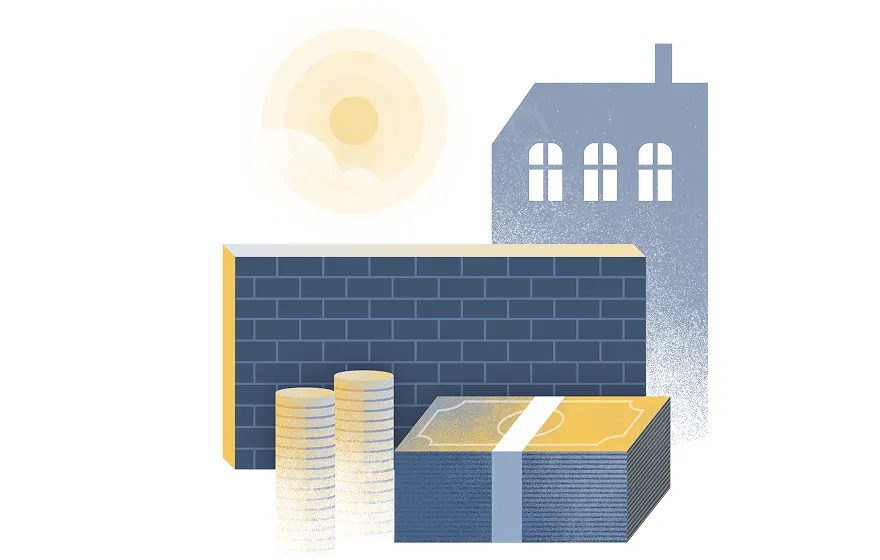Your credit score is one of the most valuable tools you have available to you. It can unlock new opportunities, like buying the home of your dreams, getting the best travel rewards credit cards, and even helping you pay off your existing debt more easily with a debt consolidation loan.
Every time you apply for credit, however, there’s a chance that your score will change. Debt consolidation does hurt your credit in some ways, but the long-term impact on your credit can far outweigh the costs if you plan strategically. We’ll help you understand how debt consolidation can impact your credit, and your life.
How does debt consolidation work
Debt consolidation is a common debt management strategy in which you take out a new, larger loan to pay off several smaller debts simultaneously. For example, people often use personal loans to pay off credit card balances.
Trading one debt for another sounds counterproductive at first, until you realize that combining multiple debts under a new umbrella gives you a unique opportunity to change your repayment structure. Here’s what you can potentially change by consolidating your debt:
- Debt type: Credit reports differentiate between “revolving credit,” like credit cards, and “installment loans,” like personal loans. Each impacts your credit score differently.
- Term length: Taking out a longer-term debt like a home equity loan means your monthly payments may be smaller. A shorter-term debt, in contrast, can help you save money on interest while paying off your debt sooner, but only if you can afford the higher payment.
- Interest rate: Most people try to get a lower interest rate when consolidating debt, which can help reduce their monthly payment and save more money.
What are your debt consolidation goals?
It’s important to be clear on your goals when you consolidate debt, because sometimes these factors don’t always align.
If you’re trying to save money on interest, for example, taking out a five-year home equity loan instead of a three-year personal loan seems like the optimal choice, since it often comes with a lower rate. In this case, however, the total interest costs can be higher simply because you’re taking a longer time to pay off your debt.
That’s why experts always recommend using a debt consolidation calculator to do the math. Make sure that the monthly payment, term length, and total financing costs align with your goals.

How debt consolidation impacts your credit score
Taking out a debt consolidation loan impacts most people’s credit scores in a few different ways. Some are positive and some are negative, and the net effect often changes over time.
Ways debt consolidation can hurt your credit
Everyone experiences some negative impacts on their credit score when they take out a debt consolidation loan, although the effect isn’t permanent for everyone, and it may even be overshadowed by the positive forces drawing their score up. Here’s what changes immediately, and how it can cause a drop in your credit score:
- New credit inquiry: Anytime you apply for credit, it’ll appear as a new credit inquiry on your report. This can lower your credit score, but usually only by a few points. The impact lessens over time, and goes away after a year.
- Lower average account age: Taking out a new debt can lower the average age of your accounts, which can lower your credit score. This isn’t a huge factor, and again, the impact fades over time.
Some people could see further damage to their credit from taking out a debt consolidation loan, particularly if their new debt comes with higher monthly payments that they struggle to make, and consequently miss payments. This can cause a lot of credit damage because payment history is the single biggest factor impacting your credit, making up over a third of your score.
Another way that debt consolidation can harm your credit is if you continue to spend more on your credit card than you can pay off in full each month. This causes your credit card balance to start growing again, and — before you know it — you’re right back where you were before, but this time with an extra debt to pay off from your consolidation loan.
Ways debt consolidation can help your credit
In truth, most people will see a net positive impact on their credit score as long as they repay their new loan as agreed. Here are the different levers that it can affect, and how that impacts your credit positively:
- Diversifying your credit mix: Lenders like to see that you can manage revolving and installment credit. If you don’t already have any loans listed on your credit report, taking out a debt consolidation loan can help do that. It’s not a huge factor, but it can help.
- Lowering the amount you owe: Your total loan balance across all accounts, as well as different types of accounts, makes up a big portion of your credit score. Debt consolidation loans that help you pay down debt faster can cause your score to rise.
- Building positive payment history: Making consistent on-time payments is the single biggest thing you can do to help grow your credit score. If a debt consolidation loan offers better terms to help you do that — whether by making payments more affordable or helping you pay off that debt faster — the more it could help your credit over time.
- Improving your credit utilization ratio: Your combined credit card balances, relative to your credit limit, is known as your “credit utilization ratio,” and it has a big impact on many people’s credit scores. Shifting credit card debt to an installment loan, where it’s viewed more favorably on your credit report, often provides a quick boost to your credit score.
Types of debt consolidation tools
There are many types of debt you can use as a debt consolidation loan, and the specific one you pick can impact your credit.
Personal loans
Personal loans are a popular option for consolidating debt. They’re usually unsecured, which means they can carry higher interest rates. However, they’re also faster to get, come with few or no fees, and you don’t run the risk of losing your collateral if you don’t repay the loan.
If you’re repaying credit card debt, personal loans are often a great fit for the amount of debt that people typically pay off. Other options that we’ll explore below, such as those that use home equity, are often a better fit for larger amounts of debt.
HELOCs and home equity loans
Home equity loans and lines of credit (HELOCs) allow you to leverage your existing home equity in order to borrow larger amounts of debt at a lower rate than unsecured options like personal loans. In 2024, the average HELOC borrower owed $45,157, according to Experian.
Home equity loans are also a good choice if you’re comfortable using your home as collateral. Taking out a one-and-done lump sum removes the temptation to borrow more money that HELOCs can come with, which can preserve the credit-boosting impact when you use it to consolidate debt. However, HELOCs do offer built-in flexibility if you need to borrow more funds later.
Home equity investments
Home equity investments, known as HEIs, offer an additional way to use your home equity. An HEI offers a lump sum that’s well-matched to pay off existing debt, similar to a home equity loan. As an added benefit, HEIs are often easier to qualify for than traditional loans if you have a low credit score, as is common with many people looking to use a debt consolidation strategy.
You also don’t have to worry about making any monthly payments; you repay the funds in a single payment, typically after a 30-year term (or when you sell or refinance the home). That can lessen the risk of a negative credit impact from missed payments over time, however, you won’t get the credit-boosting benefits that come with an established track record of on-time monthly payments, either.
401(k) loans
If you have an established balance in your workplace retirement savings plan, you may be able to borrow money from yourself to consolidate debt. You’ll also pay interest to yourself, too, and loan payments are taken straight out of your paycheck.
Those factors make 401(k) loans a popular option for debt consolidation, but keep in mind that if you stop working for your employer for any reason, you’ll need to repay all of those funds immediately or face penalties. You also won’t see any separate impact of taking out a 401(k) loan on your credit, either, since they don’t rely on a credit check and aren’t included on your credit report. However, you’ll still see the credit score boost from paying down your existing debt.
Before pursuing a 401(k) loan, consider consulting a financial advisor to ensure you understand the risks and benefits. As convenient as these types of loans are, borrowers may face a significant retirement shortfall if they fail to catch up on their contributions.
Balance transfer credit cards
Balance transfer cards offer a unique way to consolidate existing credit card debt by transferring it onto a brand-new credit card. These credit cards offer a multi-month runway with 0% interest charged, allowing you to pay down debt at a much faster rate.
It’s important to check for annual fees or balance transfer fees (typically between 3% and 5%) that can negate the cost savings. Keep in mind that you won’t get the credit-building benefit of improving your credit utilization ratio if you use another credit card to consolidate your debt, as opposed to a loan.
Alternatives to debt consolidation
Debt consolidation isn’t always the right move, and it may not be possible for everyone. If you’re struggling with your debt, here are some other options to consider, too:
- Bankruptcy: This legal process can be a lifesaver if you're struggling to repay unsecured debts, but it can have long-lasting consequences.
- Refinancing: You don’t always need to combine your debts. Sometimes, simply refinancing a single debt, like a personal loan, can help you get ahead.
- Debt settlement: You can negotiate directly with your creditors or hire a company to do it for you, although there are many risks, and it’s not guaranteed to work.
- Debt management plan: Nonprofit credit counseling companies can bridge the gap between you and your creditors to help you repay your debts on more affordable terms.
- Loan forbearance and hardship programs: If you’re going through a temporary setback, many lenders offer programs to help lessen the burden.

Is debt consolidation right for you?
Debt consolidation can be a great strategy for many people seeking to eliminate this financial burden, but it’s not the right solution for everyone. Here are a few final tips to help you understand whether it’s a good idea for you:
- Check your credit report and credit score in advance so you know what you’re likely to qualify for.
- Use debt consolidation calculators to see whether it can actually make a difference for you or not.
- If spending problems led you into debt, it’s important to address these issues first so you don’t end up in even more debt later on.
- Ensure that you set up all your bills on autopay, including any new debt consolidation loans, to continue building your credit score.
- If they’re not a spending temptation, keeping old credit cards open after you pay them off can help lengthen your credit history and improve your score further.
No income? No problem. Get a home equity solution that works for more people.
Prequalify in 60 seconds with no need for perfect credit.
Show me my offer
Frequently asked questions

Thank you for subscribing!
.webp)















